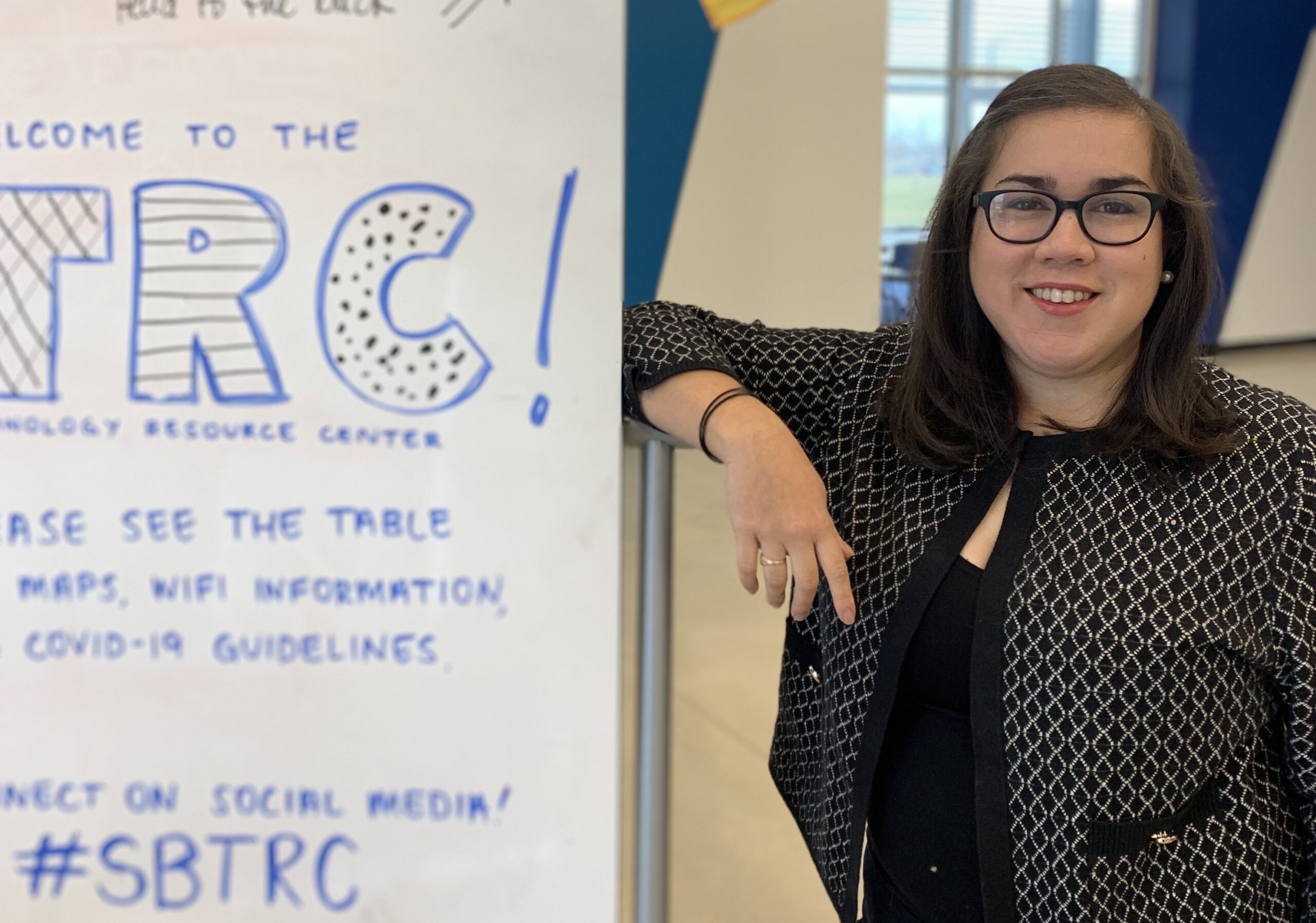Feature
Speeding Up Social Assistance in South Bend
South Bend, Indiana CIO Denise Linn Riedl MPP ’15 knows you can’t always code your way into a solution. With help from Juliahna Green MPP ’22, Riedl is expediting aid to residents in need by balancing people and process.
In March 2021, a $46.5 billion federal fund was created to provide emergency rental assistance across the U.S. Yet as the months went on, many renters hoping to avoid eviction never found relief — only red tape.
As other programs rolled out in communities in wake of COVID-19, including broadband assistance, utility assistance, and the Child Tax Credit, it became clear that the influx of funds wasn’t always reaching those in need. “Even with so much money coming from so many sources, getting that money in people’s hands is much harder than we all assume,” says Denise Linn Riedl MPP 2015 Chief Innovation Officer (CIO) of South Bend, Indiana.
Several challenges mired the rollout of relief funds and slowed down distribution. Perhaps the biggest stumbling block for vulnerable households was a lack of information about the relief programs themselves. Then, those who found programs often struggled with the arduous application process and rigidly bureaucratic program requirements, all of which made it extremely difficult to receive money when they needed it most.
Riedl, who has a long history of modernizing government services, has spent her career fixing problems like this. As South Bend’s CIO since 2019, she heads the Department of Innovation and Technology, which has long been focused on improving residents’ user experience. Riedl describes the team as “a data, design, and technology Swiss army knife for city teams and partners.”
At the start of this past summer, Riedl and her team had already invested thousands of hours improving how South Bend citizens interacted with the city government. They launched a program that directly involved residents in the testing of new applications, forms, and services, and kicked off a quarterly customer service-focused performance management meeting. Despite this progress, there was still a litany of issues to address.

When the Bloomberg Harvard City Leadership Initiative (BHCLI) offered to send a student to South Bend for a summer fellowship, Riedl welcomed the help. She had served as an Ash Center Summer Fellow in 2014, working to advance next-generation broadband networks in communities across the U.S., so she knew the value of a summer fellowship. “The Ash Fellowship was an amazing experience,” Riedl recalls.
When Juliahna Green MPP 2022 got started as a Bloomberg Harvard City Leadership Summer Fellow that June, there was no time to waste. On her first day, Riedl made sure Green was in a meeting with South Bend Mayor James Mueller, a participant in the 2020-21 BHCLI cohort of mayors. “The city and county had received a lot of federal dollars for various rescue and social assistance programs,” recalls Green. “One of the city’s higher-order priorities was figuring out how to streamline the processes for the social assistance programs so that they could be as efficient as possible.”
Working alongside Riedl and her team, Green quickly started assessing how residents were interacting with social assistance programs. From there, she made suggestions to simplify the application process for eligible residents, from trimming down applications to initiating new outreach. Through the project, the team soon noticed that one of the city’s programs had particularly low enrollment. Only an estimated 10% of all eligible households participated in the Utility Assistance Program (UAP), a progressive discount program to help low-income residents with their monthly utility bills. Since Mayor James Mueller was already proposing changes to UAP to make in more generous for vulnerable households in the summer of 2021, it was an optimal time to layer process improvement on top of policy changes.
“It was very difficult to apply [to UAP],” explains Green. Residents had to first apply to a state program, and only once admitted could they enroll in the city program. However, the state program was over-enrolled, while the city program was undersubscribed. “And I think on top of that, there were just other quirks of the application. It was asking for questions that aren’t relevant to the city program,” she notes.
Luckily, the UAP program was under the jurisdiction of the City. Riedl remembers, “It was this beautiful thing because we could say, ‘Let’s do it. Let’s make this easier.’”
“Should disproportionate suspicions result in unnecessarily complex applications for everyone and higher program administrative costs for taxpayers? I don’t think so.”
Green was tasked with leading the redesign, and her first recommendation was to extract the city program from the state, ending the required initial admittance to the state program. Then, the Department of Innovation and Technology team shortened and streamlined the application. Rather than having residents submit bank account statements and pay stubs, they asked applicants to fill out and self-certify their income. That change cut down the application time as well as the review time — from an hour to 20 minutes. Lastly, the Applications Team in Riedl’s Department began to automate the re-enrollment process, so that once a resident applied, they only needed to re-confirm their information the next year to participate again.
Critics of removing barriers to financial aid programs often cite fraud risk, but that wasn’t a concern for Riedl. “Studies and data have shown it’s pretty rare that people fraudulently sign up for these programs,” she says. “Should disproportionate suspicions result in unnecessarily complex applications for everyone and higher program administrative costs for taxpayers? I don’t think so.” For an undersubscribed program like UAP, getting aid to residents was the priority.
With Mayor Mueller’s support, all these changes happened within the span of a few months. Green, who had worked in six other municipalities, was pleased to see how fast things transpired. “I know that cities can sometimes be risk-averse about these things,” she says. “It was really exciting to get to come in and make recommendations to the mayor that ultimately changed the way that we’re staffing departments and organizing this program.”
When Green returned to Cambridge this fall, the work didn’t end. Going forward, says Riedl, the Department of Innovation and Technology will continue to improve citizens’ experience with government and social assistance programs. “For what we can control, we’ll implement user-friendly best practices: shorter applications, clear guides/directions, minimal to no required documentation, offline options, personal case management and support, cross-enrollment and program referrals … the list goes on. For processes we can’t control, we can be outreach and cross-enrollment partners.”
Though some of these things might seem out of scope for a ‘technology department,’ Riedl feels passionately that you can’t always code or build your way out of a problem. Modernizing government is about problem-solving — not leading with the solution first. “I always tell my team not to lead with tech, despite the skills and biases we have. Some of [the solutions] have been tech, much of it has been process, and even more of it has been humans.”
